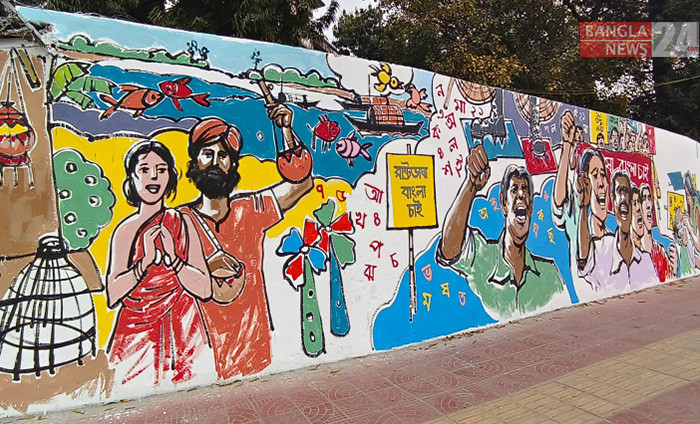The nation is observing the 'Shaheed Dibash' (Martyrs Day) and the International Mother Language Day today (21 February) with due respect.
People from all walks of life pay glowing tributes to the memories of language movement martyrs, the valiant sons of the soil who fought and died on February 21 in 1952 to make mother tongue Bangla a state language.
The day is also being observed around the world as the UNESCO recognised the ‘February 21 (Ekushey February)’ as the International Mother Language Day on November 17, 1999.
The government has taken extensive programmes to mark the ‘Shaheed Dibash’ and the International Mother Language Day in a befitting manner.
President Mohammed Shahabuddin and Prime Minister Sheikh Hasina have paid glowing tributes to the martyrs of the historic Language Movement.
The President paid the homage by placing wreaths at the Central Shaheed Minar at one minute past midnight tonight.
After him, the Prime Minister paid the homage by placing wreaths at the Central Shaheed Minar.
Both the president and the premier earlier issued separate messages paying rich tributes to those who embraced martyrdom.
The day is a public holiday.
 In observance of the day, the Central Shaheed Minar premises has been decorated with paintings, graffiti, buntings and selected verses on the mother language.
In observance of the day, the Central Shaheed Minar premises has been decorated with paintings, graffiti, buntings and selected verses on the mother language.
Tight security measures have been enforced around the main altar of the Shaheed Minar, its adjoining areas and Azimpur graveyard of the language martyrs.
Different political-social-cultural-professional organizations, including the ruling Awami League, have taken various programmes such as seminars and cultural functions, to observe the Amar (immortal) Ekushey in a befitting manner.
The Cultural Affairs Ministry has drawn up an elaborate programme to observe the day at national level.
The national flags have been kept half-mast in a proper manner having accurate size at all the buildings of government, semi-government, autonomous and private organisations and educational institutions.
In line with the national programmes, all educational institutions, local government bodies, district and upazila administrations, Bangladesh missions abroad have taken proper measures to observe the day.
All educational institutions, local government bodies, district and upazila administrations, Bangladesh missions abroad will take proper measures to observe the day.
Fateha and Qurankhwani will be offered at Azimpur graveyard and special prayers will be arranged at mosques and all other places of prayers across the country seeking eternal peace of the souls of the language martyrs.
On the occasion, road islands and other important places in the capital will be decorated with festoons inscribed with letters of different languages including Bangla.
Public and private media will air special programme while newspapers will publish special supplements marking the day.
In order to ensure emergency medical services, medical camps will be set up in the Shaheed Minar areas and a sufficient number of ambulances will be kept ready to this end.
Bangladesh missions abroad will organize different programmes, including placing wreaths at Shaheed Minar, discussions on Bangabandhu and Language Movement, and book and photo exhibitions where diplomats of different countries and Bangladeshi expatriates will join.
Marking the day, Bangla Academy, Bangladesh Shilpakala Academy, Kabi Nazrul Institute, National Book Centre, Islamic Foundation, Bangladesh National Museum, Department of Archaeology, Department of Public Libraries, International Mother Language Institute, Department of Archives and Library, Bangladesh Folk Art and Crafts Foundation, Bangladesh Shishu Academy, Small Ethnic Groups Cultural Institute, three districts in hill tracts,
Tribal Cultural Academy in Birishiri of Netrokona, Rajshahi Divisional Ethnic Minority Cultural Academy (RDEMCA), Manipuri Lalitkala Academy, Cox's Bazar Cultural Centre and other organizations and institutions will organize book fairs, discussions, seminars, symposiums, poem recitation, drawing and hand writing competitions and screen documentaries.
Children, students, senior citizens and the children with special needs could visit the National Museum and its affiliated branch museums and all the archeological sites and museums under the Department of Archaeology free of cost.
Besides, a discussion will be held at 3 pm at Dhaka district Awami League office at Tejgaon on February 22. Awami League President and Prime Minister Sheikh Hasina will chair the discussion.
In a statement, AL General Secretary and Road Transport and Bridges Minister Obaidul Quader urged all leaders and workers of the party, associate and like-minded bodies to observe the day across the country with due respect.
On this day in 1952, students and people from all strata of society took to the streets in Dhaka to protest the then Pakistan government’s refusal to recognize Bangla as one of the state languages and its attempt to impose Urdu as the only official language of Pakistan.
Salam, Barkat, Rafiq, Shafiur, Jabbar and a few other brave sons of the soil sacrificed their lives to establish Bangla as a state language of the then Pakistan.
The Language Movement is indeed the most important turning point in the history of Bangalee as its spirit led to the Independence of Bangladesh through a bloody nine-month war in 1971.
BDST: 0938 HRS, FEB 21, 2024
SMS







.jpg)












